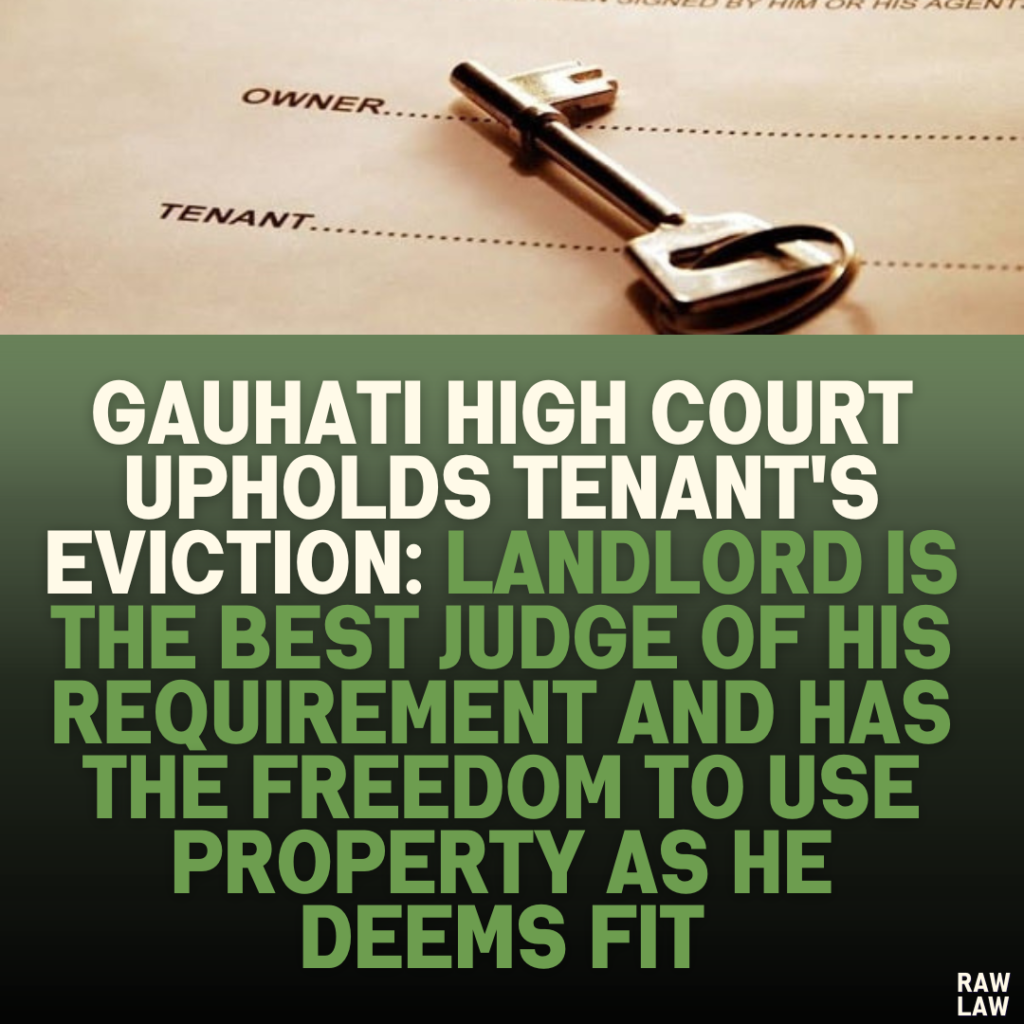1. Court’s Decision
The Gauhati High Court dismissed the tenant’s revision petition under Section 115 of the Code of Civil Procedure (CPC), affirming:
- The trial court’s judgment and decree directing eviction of the tenant for default in payment of rent and bona fide requirement.
- The appellate court’s decision upholding the trial court’s findings.
The High Court clarified that the landlord’s need was genuine and that the tenant’s actions violated the tenancy agreement and legal requirements under the Assam Urban Areas Rent Control Act, 1972.
2. Facts
The case revolves around a tenancy dispute dating back decades:
- Tenancy Agreement: The landlord rented a residential property to the tenant in 1973 under an agreement fixing monthly rent at ₹150.
- Irregular Rent Payments: Over time, the tenant became irregular in paying rent and refused to comply with a rent increase agreed upon in 2000, raising the monthly rent to ₹450.
- Unauthorized Modifications: In 2004, the tenant made unauthorized structural changes to the property, constructing a reinforced concrete structure and installing a water tank without the landlord’s permission.
- Accrued Arrears: By April 2006, rent arrears of ₹7,700 had accrued. The landlord filed a suit for eviction citing:
- Default in payment of rent.
- Unauthorized modifications.
- Bona fide need for the premises for business expansion.
3. Issues
The legal questions before the court were:
- Whether the suit was maintainable under law and facts.
- Whether the suit was barred by limitation.
- Whether the tenant defaulted in payment of rent.
- Whether the landlord’s claim of bona fide requirement for business expansion was genuine.
- Whether the landlord was entitled to the reliefs sought, including eviction and recovery of arrears.
4. Petitioner’s (Tenant’s) Arguments
The tenant contested the eviction suit on several grounds:
- Invalid Tenancy Agreement: The tenant argued that the tenancy agreement lapsed in 1980, making him a trespasser rather than a tenant.
- Irregular Payments Accepted: Rent payments were often delayed but accepted by the landlord without objection, creating an implied understanding.
- No Bona Fide Requirement: The landlord had other properties suitable for business expansion, negating the need for the disputed premises.
- Deposited Rent in Court: The tenant contended that rent was deposited in court after the landlord refused to accept payment.
5. Respondent’s (Landlord’s) Arguments
The landlord rebutted the tenant’s claims, asserting:
- Default in Rent Payment: The tenant failed to tender rent directly before depositing it in court, violating Section 5(4) of the Assam Urban Areas Rent Control Act, 1972.
- Unauthorized Modifications: The tenant’s structural changes to the property breached the terms of the tenancy agreement.
- Bona Fide Requirement: The landlord genuinely required the premises for business expansion and had obtained necessary permissions for construction.
6. Analysis of the Law
The court analyzed the case under the following legal provisions and principles:
Default in Rent Payment:
- Section 5(4) of the Assam Urban Areas Rent Control Act, 1972: This section requires tenants to tender rent to the landlord before depositing it in court if the landlord refuses to accept payment.
- The tenant failed to prove tendering rent, making his deposits in court invalid.
- Precedents:
- Kalikumar Sen v. Makhanlal Biswas and Deoki Nandan Bajaj v. Luku Barman: Depositing rent in court without prior tendering is non-est in the eye of the law.
Bona Fide Requirement:
- The landlord demonstrated that the property was required for business expansion and that necessary permissions for construction had been obtained.
- Precedents:
- Ragavendra Kumar v. Firm Prem Machinary & Co.: Landlords are the best judges of their property requirements.
- Sait Nagjee Purushotham & Co. Ltd. v. Vimalabai Prabhulal: Bona fide requirement includes the need for business expansion.
7. Precedent Analysis
The court extensively referred to previous judgments to support its reasoning:
- Landlord’s Discretion:
- Ragavendra Kumar: Landlords have the discretion to determine their requirements.
- Tenant’s Limitations:
- Anil Bajaj v. Vinod Ahuja: Tenants cannot dictate how landlords utilize their property.
- Genuine Need:
- Sait Nagjee Purushotham: The landlord’s need for business expansion was recognized as genuine.
8. Court’s Reasoning
- Default in Payment:
- The trial court found that the tenant defaulted by depositing rent in court without tendering it to the landlord first, violating the Assam Urban Areas Rent Control Act, 1972.
- Evidence submitted by the landlord corroborated the claim of arrears.
- Bona Fide Requirement:
- The landlord’s need for the premises for business expansion was supported by evidence, including permissions for construction and plans for repair.
- The court rejected the tenant’s argument that the landlord could use other properties, emphasizing that landlords have the discretion to decide how their property is used.
- Unauthorized Modifications:
- Structural changes made by the tenant without consent further justified eviction.
9. Conclusion
The court upheld the findings of both the trial court and appellate court, affirming:
- The tenant defaulted on rent payments.
- The landlord’s need for the premises was bona fide.
- Unauthorized modifications violated the tenancy agreement.
The revision petition was dismissed, with both parties directed to bear their own costs.
10. Implications
The judgment has significant implications:
- Reinforces Landlord Rights:
- Landlords retain discretion over the use of their property, provided their requirements are bona fide.
- Strict Adherence to Rent Laws:
- Tenants must comply with statutory requirements for rent payment and cannot bypass tendering.
- Deterrence Against Unauthorized Modifications:
- Tenants making unauthorized changes risk eviction.
This case serves as a precedent for landlord-tenant disputes, particularly in affirming the rights of landlords to reclaim their property for legitimate needs.
